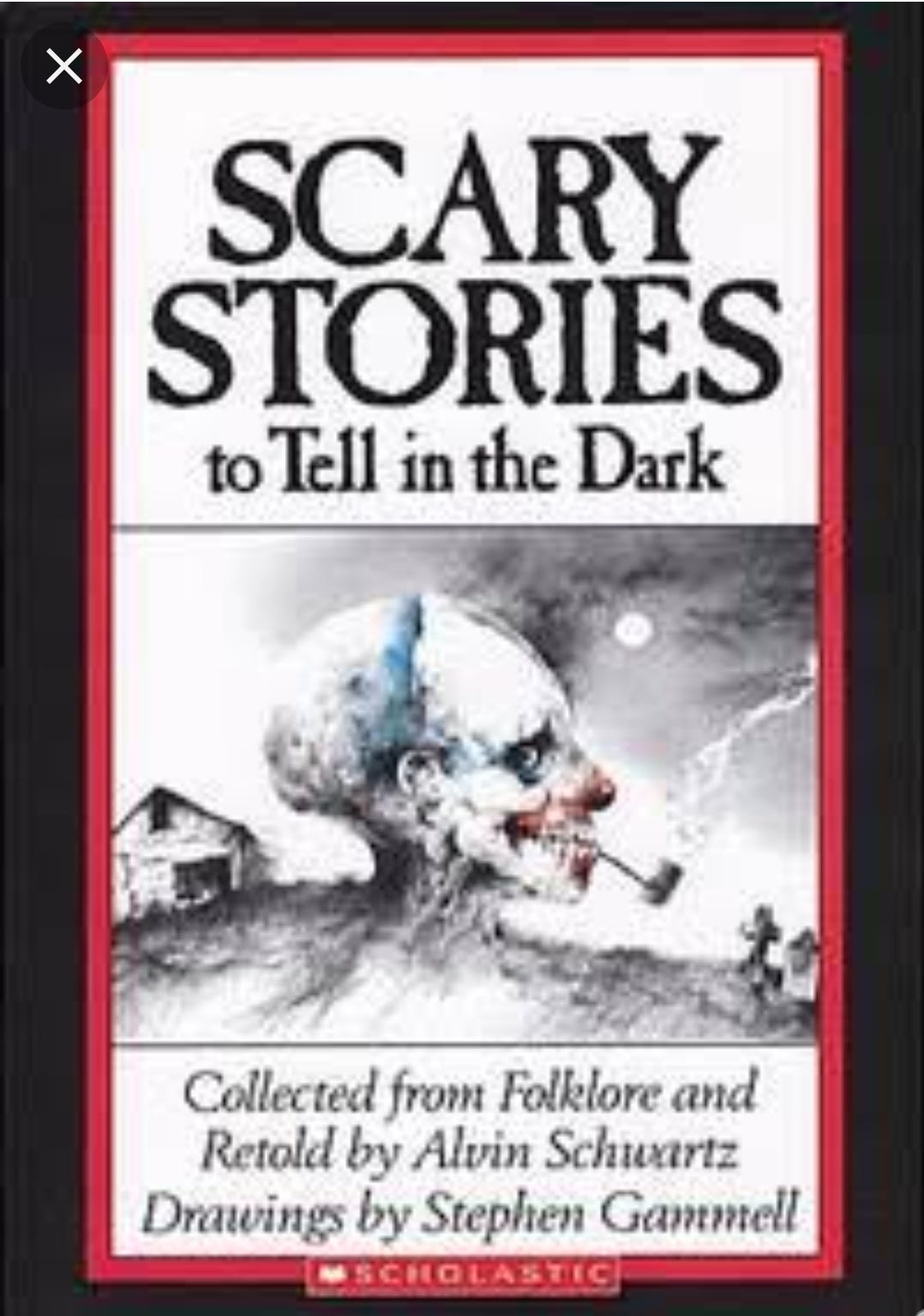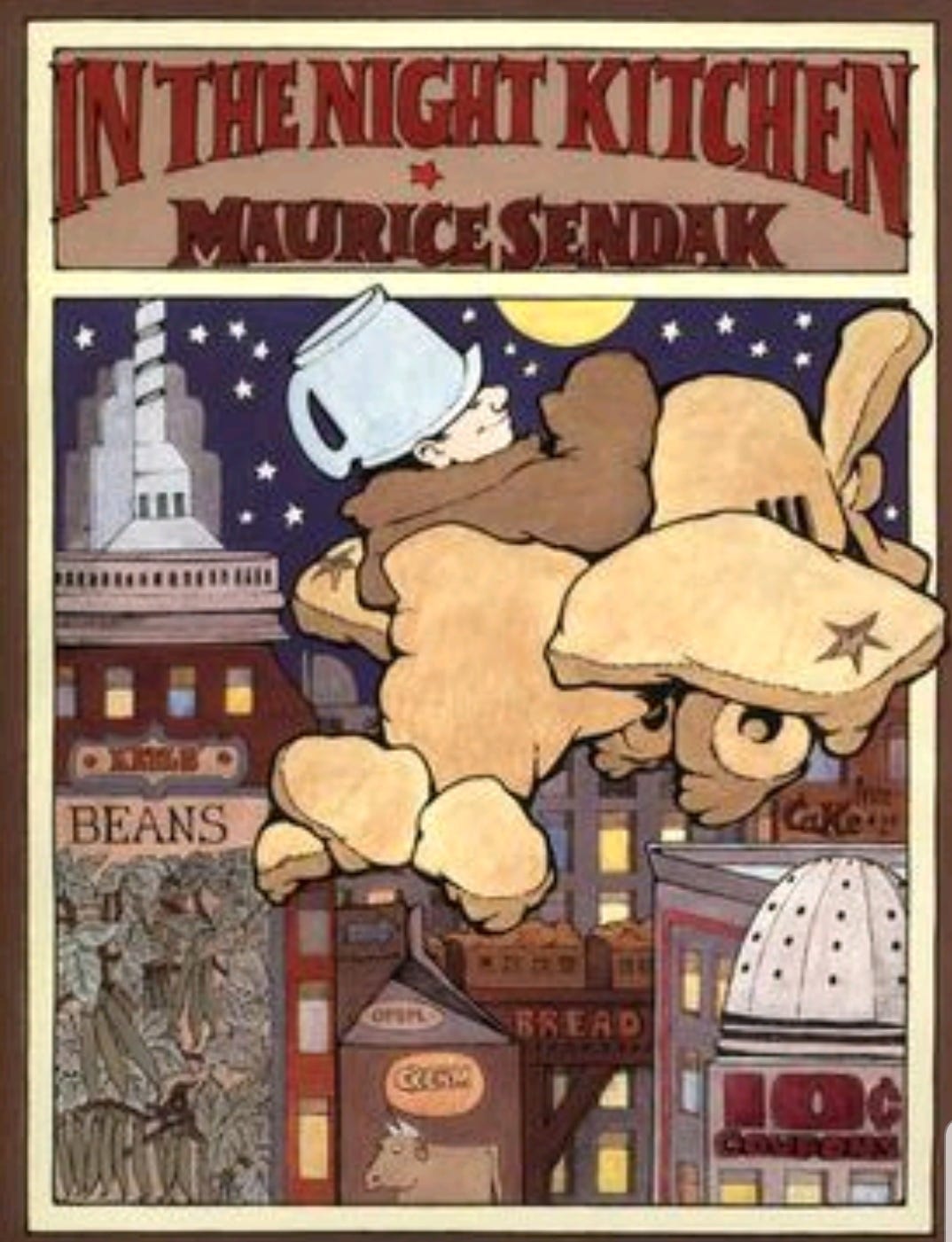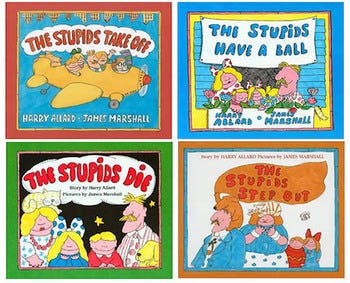1978: BRIDGE TO TERABITHIA by Katherine Paterson
Ba-room, ba-room, ba-room, baripity, baripity, baripity, baripity—Good. His dad had the pickup going.
For the first Newburied selection, I had to find the Newberyest Newbery medalist, and there was one obvious pick. We have one of the most famous medalists of all time to kick off the series, with probably one of the most famous endings of all time. But this book also holds another important distinction among Newbery medlists, one that I didn’t know unntil I started doing research for this piece: it is also one of the most banned and challenged medalists of all time.
And that might seem weird to you - especially in light of the recent wave of book bans across the country - because if you think back to when you read Katherine Paterson's Bridge to Terabithia, the 1978 medalist, you probably don't remember anything from the book that would cause a huge outcry from puritanical parents. You don't remember any sexy stuff, you don't remember any swear words, you don't remember passing this book around in your classroom being like "you've gotta check this out, but make sure your parents don't catch you reading Bridge to Terabithia". If you remember anything about the book at all, you remember this: one of the main characters dies at the end in a "faulty rope swing" accident. You probably saw the title of this piece and said "oh yeah, Bridge to Terabithia, that's the one where the girl dies because the rope swing breaks?" The book's tragic ending was even immortalized in the sitcom New Girl, when Zooey Deschanel got off the zinger "I might as well call you Bridge to Terabithia, because you make children cry," which is a funny line by itself, but made even funnier by the fact that Deschanel was actually in the 2007 film adaptation of Bridge to Terabithia. She's shown below portraying the free-spirited guitar-playing schoolteacher in Terabithia, as opposed to her role in New Girl, where she portrayed a free-spirited guitar-playing schoolteacher.
So that's what people remember from the book: there's a fatal rope swing accident and a character dies at the end. Beyond that, Terabithia probably isn't a book that you would consider controversial, edgy, or taboo. So why was it, at one point, one of the most challenged children's books of all time? We'll get to that in a minute, but let me ratchet up the anticipation right now by revealing: the reason is very stupid.
Of course, every reason behind banning a book is very stupid, there are no good reasons to ban a book. But the reasons we're seeing in the 2020s, with their panics over "grooming" and "critical race theory", are unusually focused. They're still specious and bad and dishonest, but they're focused, and challenges to books before the 2020s were much less focused. For example: Terabithia, according to the ALA, was one of the ten most challenged books of the 1990s, the first decade where the ALA started tracking challenges nationally, and decades after Terabithia's original release. But the number one most challenged children's book of the 1990s, the book that upset the greatest number of parents in a decade which saw national conversations on workplace sexual harrassment, a crime wave, a mass incarceration crisis, gay Americans serving in the military, and a president having an affair with an intern, was this one:
Yes, the biggest problem in schools and libraries in the 1990s was that books were just too spooky. Specifically, in the book above, the illustrations were too spooky; if you've read Schwartz's series, you know that these stories aren't graphic or even really scary at all, and most of them are built around popsicle-stick-level dumb puns. The 1990s also saw a significant number of challenges to this book series:
Yeah, R.L. Stine's Goosebumps was also a prime target for bans and challenges, despite also being mainly silly and goofy instead of scary, not really containing any content that would earn them more than a PG rating for "mild thematic elements" if it were in a film, and not containing any critical race theory at all, unless you consider ventriloquist dummies an inferior race (which you absolutely should). Another prime target for 1990s book bans was this book:
That's a picture book by Maurice Sendak about a boy who has a dream where he visits a magic kitchen and almost gets baked in a cake. The book is maybe twenty pages and fifty words long, but the boy is naked in his dream and you see a not-very-detailed drawing of his genitals. So parents and activists brought the hammer down on this one, too; when my mom worked as a public librarian, one parent asked her if they could possibly draw shorts on each page to cover the boy (the library declined). Weirdly, Sendak has said in interviews that he intended the story to be a Holocaust metaphor, which I think should be talked about much more than the naked little boy.
Another frequent target of bans during the 1990s was this series:
These books, a bestselling series that was at one point adapted into a film starring Tom Arnold, got repeatedly challenged because…well, they say "Stupid" on the cover, and parents were worried about their children becoming too rude.
Across all of these examples, you don't see queer characters or critiques of systemic racism or even swear words. Plenty of challenged books have all of those, to be sure, and perennial targets like Catcher In The Rye or The Adventures Of Huckleberry Finn will always be on these lists too, but just as many books are challenged for stupid reasons like these. Terabithia was one of them. We should look at what actually happens in the book.
The protagonist of Terabithia is Jess Aarons, a fifth grade boy in rural Virginia whose life seems to be pretty miserable and insular. He has strained relationships with everyone in his household except his little sister, his family has no money, his dad is underemployed, he's scared that his classmates will make fun of him because he likes to draw in his spare time, and the only thing he looks forward to at school is music class because he has a crush on his teacher (she looks like Zooey Deschanel). Things start to turn around when the Burke family moves next door and Jess befriends their daughter Leslie, who doesn't exactly fit in to rural Virginia either. Leslie's parents are erudite authors who don't own a television and are moving out to farmland to get away from the big city, and Leslie herself is a tomboy who wears pants to school and can run faster than any of the boys.
These two loners befriend each other, and Leslie shows Jess a new world, supporting him his artistic hobbies and introducing him to the stories of Moby-Dick and Hamlet and Narnia. When the two of them go exploring out by the creek and find an old rope swing, they invent an imaginary land that they can retreat to together when they get sick of the real world:
"We need a place,” she said, “just for us. It would be so secret that we would never tell anyone in the whole world about it.” Jess came swinging back and dragged his feet to stop. She lowered her voice almost to a whisper. “It might be a whole secret country,” she continued, “and you and I would be the rulers of it.” Her words stirred inside of him. He’d like to be a ruler of something. Even something that wasn’t real."
That magical world is Terabithia, which can only be entered by the rope swing. Jesse and Leslie make up their fantasy adventures during their journeys to Terabithia, and their friendship continues to develop until one afternoon when he skips hanging out with Leslie to go to the museum with his doe-eyed music teacher. Leslie goes to Terabithia by herself, but the rope swing snaps and she hits her head and dies. That is, obviously, a spoiler, but it is one of the most infamous deaths in all of children's literature, and Paterson foreshadows it so heavily throughout the novel, with so many reminders that the rope swing is scary and possibly unsafe, that I'm shocked more characters don't die in rope swing accidents before the end of the novel. Take this:
"For the first time in many years the creek bed held water, not just a trickle either, enough so that when they swung across, it was a little scary looking down at the rushing water below."
Or this:
"“Yeah.” Jess looked up at the rope. It was still twisted around the branch of the crab apple tree. His stomach felt cold. “Maybe we ought to forget it today.”“C’mon, Jess. We can make it.”"
Or this:
"For Jess the fear of the crossing rose with the height of the creek. Leslie never seemed to hesitate, so Jess could not hang back. But even though he could force his body to follow after, his mind hung back, wanting to cling to the crab apple tree the way Joyce Ann might cling to Momma’s skirt."
Or this:
"He hardly slept the rest of the night, listening to the horrid rain and knowing that no matter how high the creek came, Leslie would still want to cross it."
Or this:
"I know Leslie. I know she’s not going to bite my head off or make fun of me if I say I don’t want to go across again till the creek’s down. All I gotta do is say “Leslie, I don’t wanta go over there today.” Just like that. Easy as pie. “Leslie, I don’t want to go over there today.”“How come?”“How come. Because, because, well because."
Or, I don't know, this:
"She smiled. “OK,” she said. “But I still don’t think God goes around damning people to hell.” They smiled at each other trying to ignore May Belle’s anxious little voice. “But Leslie,” she insisted. “What if you die? What’s going to happen to you if you die?”"
One assumes that the first draft of the cover design for the 40th Anniversary Edition included a giant arrow pointing to the rope with the caption "JUST SO YOU KNOW THIS ROPE IS GONNA SNAP AND LESLIE IS GONNA DIE"
So, Terabithia is a tearjerker, and it's not subtle, but it's also well-written, it's an easy read, and it doesn't have to be subtle because fifth graders are supposed to read it. Jess's grief in the final chapters of the novel - a novel that may expose a reader, for the first time, to a stupid, meaningless, tragic death - is devastating, and starts with cold denial before moving through numbness and rage. For the first time in his life, Jess didn't feel alone in his world, a world constricted around his family farm and his school where nobody really likes him, and as soon as he got used to his new world where he wasn't alone anymore, his guide was taken away from him:
"She had made him leave his old self behind and come into her world, and then before he was really at home in it but too late to go back, she had left him stranded there—like an astronaut wandering about on the moon. Alone."
It's brutal, but the lesson of the book, of course, the lesson that Leslie actually taught Jess, was that he was never really alone. There's an incredible world out there full of stories and art and good friends and people who will love him for who he is, and yes, grief and loss too, but only as symptoms of that love. Paterson even hints at this when Jess goes to the museum with his teacher and is overwhelmed by his first experience seeing famous works of art; it's the only thing in the "real world" he compares to his adventures in Terabithia. And Jess does ultimately take this lesson away:
"...hadn’t Leslie, even in Terabithia, tried to push back the walls of his mind and make him see beyond to the shining world—huge and terrible and beautiful and very fragile? (Handle with care—everything—even the predators.) Now it was time for him to move out. She wasn’t there, so he must go for both of them. It was up to him to pay back to the world in beauty and caring what Leslie had loaned him in vision and strength."
If you're a fifth grader, like Jess, and you pick up this book, you might cry, you might think it's a huge bummer, but you also might pick up the message that you're not alone, that your world is very small right now but there's a "huge and terrible and beautiful and very fragile" world waiting to welcome you, and that you have a responsibility to bring beauty and caring to that world. Paterson wrote in a new afterword for the 40th anniversary reprint of the novel that she has heard from countless readers who took this message to heart, not just as they processed grief, but as they struggled, in so many different ways, to realize that they weren't alone:
"There was the Chinese child who needed to tell me about the death of her own best friend, her only friend, and how Jesse had given her the strength to go on. The child in the psychiatric hospital who would not speak or even show emotion until the college student who was the nighttime counselor read him Bridge at bedtime and they shed tears together. That night the child decided he should begin to write books, and through the books his young counselor helped him “publish,” his psychiatrist and his parents were finally able to hear what the boy had locked up in his tortured young soul. There was the child who found her family’s dark secrets were suddenly the gossip of all her classmates and only got through the most horrible time of her life by remembering Leslie’s advice...And there was the young adult who wrote to say that when, as a ten-year-old, she read about Leslie and Jesse and saw how they refused to play the gender roles society had assigned them, it had saved her from self-hatred and helped her to accept herself. How could I have imagined such responses?"
The world is bigger than you think, and you're not alone in it. Terabithia is the first book for many readers that spells out this message so directly. And that's the underlying message of every good work of fiction, it's the message that makes fiction worth writing to begin with, it's a critical message for children everywhere to hear, and it's a powerful and very direct message in what is, even to an adult, a moving and memorable story.
Anyways, this book was banned for witchcraft.
I mean, Terabithia has been challenged for all sorts of reasons; some parents were squeamish about death and grief being a major plot point, some parents didn't like that Leslie was openly atheist, some parents didn't like that Jess frequently used "lord" as an interjection, but a lot of the challenges came from this scene, which occurs right after Jess and Leslie win another imaginary battle to defend Terabithia:
""At last. Terabithia is free once more.” The king sat down on a log and wiped his face, but the queen did not let him rest long. “Sire, we must go at once to the grove of the pines and give thanks for our victory.” Jess followed her into the grove, where they stood silently in the dim light. “Who do we thank?” he whispered. The question flickered across her face. “O God,” she began. She was more at home with magic than religion. “O Spirits of the Grove.”“Thy right arm hast given us the victory.” He couldn’t remember where he’d heard that one, but it seemed to fit. Leslie gave him a look of approval. She took up the words. “Now grant protection to Terabithia, to all its people, and to us its rulers…Amen.”"
It turns out that, even though this is a book explicitly about children playing pretend, some parents will still raise a stink if they see someone "praying" to "the spirits of the grove" and worry that such a scene will poison their child's mind. That may seem stupid to you. To me, it seems about as stupid as banning In The Night Kitchen for nudity, or banning Scary Stories To Tell In The Dark for spookiness, or banning To Kill A Mockingbird for racism. Or, if we want to use more recent examples, banning MAUS for nudity or banning Antiracist Baby for having a hidden message about how white people are evil. There is no good cause for banning a book at a school or a library, and there is only one consistent effect of banning a book anywhere: people are deprived of the message that Bridge To Terabithia has for readers, that the world is bigger than you think, and that you're not alone in. As for the people who don't want us to hear that message, in the words of Leslie Burke, "that’s what you’ve got to understand. You have to stop people like that. Otherwise they turn into tyrants and dictators.”
Newburied is a series by Tony Ginocchio on the history of the Newbery Medal and a whole bunch of other stuff related to it. You can subscribe via Substack to get future installments sent to your inbox directly. The next installment will cover the 2013 medalist, The One And Only Ivan by Katherine Applegate.







